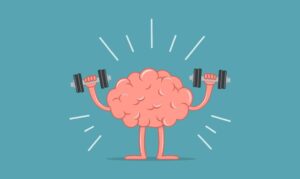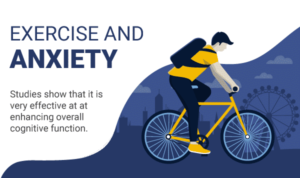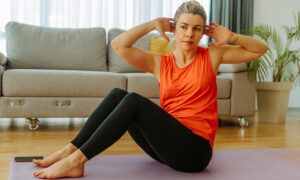Exercising has many benefits from stronger muscles to a sharper mind. There are so many different types of exercises you can do, and some are very challenging, but the rewards are worth it. Exercise is just one of those things you really don’t know what you have until you lose it-be proactive and add some physical activity into your day!
Contents
- 1 What Is Exercising?
- 2 Exercising Benefits For Physical Health
- 3 Exercising Benefits On Mental Health
- 4 Other Exercising Benefits
- 5 Types Of Exercises
- 6 Finding the Right Type of Exercise for You
- 7 How To Get Started With Exercising?
- 8 Are there any negative effects of exercise?
- 9 Can I Exercise In Pregnancy/Breastfeeding?
- 10 Tips If You Don’t Like Exercising
- 11 Conclusion
- 12 A Word From Therapy Mantra
What Is Exercising?

Exercising is any physical activity that you do to improve your health or fitness. It can include anything from running and hiking to weightlifting and yoga. Many people think of exercise as a chore, but if you find the right type of exercise for you, it can be enjoyable and rewarding.
Exercising is one of the best things you can do for your body. Aside from keeping you healthy and fit, it also has other benefits such as reducing stress, making you sleep better, and raising your self-esteem. If you don’t believe us, here are some of the benefits that people who exercise have experienced.
Exercising Benefits For Physical Health

There are many benefits to exercising, both physical and mental. Some of the physical benefits include:
- Increased strength and endurance- As you continue to exercise, your body will become stronger and more resilient. You will be able to do more strenuous activities with less fatigue.
- Improved cardiovascular health- Exercising regularly can improve your heart health, making it less likely that you will suffer from a heart attack or stroke.
- Increased flexibility- As you stretch your muscles, they will become more flexible. This can help you move more easily and with less pain.
- Improved bone health- Exercise can help keep your bones healthy and strong, reducing your risk of developing osteoporosis.
Exercising Benefits On Mental Health

The mental benefits of exercise are just as important as the physical ones. Exercising can help improve your mood, reduce stress, and improve your self-confidence. It can also help you sleep better and boost your overall energy levels.
Exercising has many mental health benefits as well. Some of these benefits include:
- Reduced stress- Exercising can help to reduce the levels of stress hormones in your body. This can help you feel more relaxed and calm.
- Improved mood- Exercise can help to improve your mood and make you feel happier and more positive.
- Enhanced self-esteem- When you see that you are able to accomplish physical goals, it can boost your self-esteem and make you feel better about yourself.
- Better sleep quality- Exercise can help to improve your sleep quality, making it easier for you to get the rest you need.
So, as you can see, there are many benefits to exercising. Whether you are looking for physical or mental health improvements, exercise can help. If you are unsure of where to start, consult a fitness professional to create a personalized exercise plan for you. With a little effort, you can start seeing the benefits of exercise in no time!
Exercising Benefits On Anxiety

Exercising can help to reduce the levels of stress hormones in your body. This can help you feel more relaxed and calm. In addition, exercise can help to improve your mood and make you feel happier and more positive. When you see that you are able to accomplish physical goals, it can boost your self-esteem and make you feel better about yourself. Finally, exercise can help to improve your sleep quality, making it easier for you to get the rest you need. All of these benefits can help to reduce anxiety symptoms and improve your overall quality of life.
Exercising Benefits For Stress
There are many benefits to exercising, both physical and mental. Exercise can help to reduce the levels of stress hormones in your body, improve your mood, boost your self-esteem, and improve your sleep quality. All of these benefits can help to reduce anxiety symptoms and improve your overall quality of life.
If you are feeling stressed out, consider starting an exercise routine. Exercise can help to calm the mind and body, and it can be a great way to relieve tension and anxiety. Exercising also provides a sense of accomplishment and can help to boost your mood. If you are having trouble sleeping due to stress, consider exercising earlier in the day. This can help to energize you and make it easier for you to fall asleep at night.
Exercising Benefits For Trauma

Exercising can be an important part of the healing process after a traumatic event. Exercise can help to reduce stress and anxiety, improve mood, and boost self-esteem. It can also help to improve sleep quality and overall energy levels.
If you have experienced a traumatic event, consider starting an exercise routine. Exercise can help you to cope with the emotional aftermath of the event. It can provide a sense of control and mastery, and it can be a way to express your emotions. In addition, exercise can help to release endorphins, which can improve your mood and make you feel happier and more relaxed.
When beginning an exercise routine after a traumatic event, it is important to start slowly. Choose a low-intensity activity that you feel comfortable doing. As you progress, you can gradually increase the intensity and duration of your workouts. It is important to listen to your body and take breaks as needed. If you are feeling overwhelmed or stressed, stop exercising and seek professional help.
Exercising Benefits For ADHD
Exercising can be an important part of managing ADHD symptoms. Exercise can help to improve focus, reduce impulsiveness, and improve mood. It can also help to improve sleep quality and overall energy levels.
When beginning an exercise routine, it is important to start slowly. Choose a low-intensity activity that you feel comfortable doing. As you progress, you can gradually increase the intensity and duration of your workouts. It is important to listen to your body and take breaks as needed. If you are feeling overwhelmed or stressed, stop exercising and seek professional help.
Exercising Benefits For Depression

There are many benefits to exercising, both physical and mental. Exercise can help to reduce the levels of stress hormones in your body, improve your mood, boost your self-esteem, and improve your sleep quality. All of these benefits can help to reduce anxiety symptoms and improve your overall quality of life.
If you are feeling depressed, consider starting an exercise routine. Exercise can help to lift your mood and make you feel happier and more positive. In addition, exercise can help to release endorphins, which can improve your mood and make you feel happier and more relaxed. When you see that you are able to accomplish physical goals, it can boost your self-esteem and make you feel better about yourself. Finally, exercise can help to improve your sleep quality, which can help to reduce feelings of depression.
Other Exercising Benefits
Exercising has many other benefits that people may not be aware of. Some of these benefits include:
- Better Memory: Regular exercise can improve memory and cognitive function.
- Protection Against Disease: Exercise can help to reduce the risk of diseases such as cancer, heart disease, stroke, and Alzheimer’s disease.
- Weight Loss/Maintenance: Exercise can help to burn calories and promote weight loss or maintenance.
- Improved Flexibility: Exercise can help to improve flexibility and range of motion.
- Improved Bone Health: Exercise can help to improve bone density and reduce the risk of osteoporosis.
- Higher self-esteem: When people see that they are able to accomplish physical goals, it can boost their self-esteem and make them feel better about themselves.
- Better sleep: Exercise can help to improve sleep quality and duration.
- Resiliency: Exercise can help to improve physical and emotional resilience.
- More Energy: Exercise can help to improve overall energy levels.
So, there are many benefits to exercising, both physical and mental. If you are feeling stressed, anxious, or depressed, consider starting an exercise routine. You will likely see a positive change in your mood and overall well-being.
Types Of Exercises

There are many different types of exercises that you can do to improve your health and fitness. Some of the most popular types include:
- Running and hiking- These exercises are great for improving cardiovascular health and strengthening your muscles.
- Weightlifting- Weightlifting can help increase strength and endurance, as well as improve bone health.
- Yoga- Yoga is a great way to improve flexibility and reduce stress levels.
- Swimming- Swimming is a great exercise for all-around fitness as it works both your upper and lower body.
There are many other types of exercises that you can try, depending on your interests and fitness level. If you are unsure of which type of exercise is right for you, consult a fitness professional. With a little experimentation, you will find the perfect type of exercise to help you meet your health and fitness goals!
Finding the Right Type of Exercise for You
Not everyone enjoys the same type of exercise. Some people prefer high-intensity activities like running or weightlifting, while others prefer more low-key exercises like yoga or Pilates. It is important to find an activity that you enjoy so that you will be more likely to stick with it.
If you are just starting out, it may be a good idea to try a few different types of exercise before settling on one. You can also join a fitness class or go for a walk or run with friends to make exercising more fun. Whatever you do, just be sure to get moving!
How To Get Started With Exercising?

If you are looking to start an exercise routine, there are a few things you need to consider.
- First, you need to make sure that you have the time and energy to commit to regular exercise.
- Second, you need to find an activity that you enjoy and that fits into your schedule.
- Finally, you need to make sure that you have the proper equipment and attire for your chosen activity.
- Find a supportive community. Exercise can be more fun when done with friends. Find a group of people who enjoy working out and do your workouts with them.
- Get a personal trainer. If you need some guidance, consider hiring a personal trainer to help you get started.
Once you have considered these things, it is time to get started! The best way to begin is by gradually adding more exercise into your current routine. For example, if you usually only walk for 30 minutes a day, try adding a 10-minute jog or bike ride to your routine. You can also try joining a fitness class or going for a walk or run with friends.
Whatever you do, just be sure to get moving! Exercise is an important part of a healthy lifestyle and can provide many health benefits.
Are there any negative effects of exercise?
While there are many benefits to exercise, there can also be some negative effects.
- For example, too much exercise can lead to overtraining, which can lead to fatigue, injuries, and other health problems.
- Additionally, if you are not properly hydrated, you may experience dehydration or heat exhaustion when exercising in hot weather.
It is important to listen to your body and take breaks when needed. If you are feeling tired or sick, it is best to stop exercising and consult a health professional. Exercising too hard or too often can cause more harm than good, so be sure to take it easy and build up your routine gradually.
Can I Exercise In Pregnancy/Breastfeeding?

Most pregnant women can continue to exercise during their pregnancies, as long as they are feeling well. However, it is important to consult with a doctor before starting or continuing any type of exercise routine.
Many breastfeeding women also choose to continue exercising, although they may need to adjust their routine depending on how much milk they are producing. Again, it is best to speak with a doctor or health professional before starting or continuing an exercise routine while breastfeeding.
Tips If You Don’t Like Exercising
If you don’t enjoy exercise, it can be tough to stick with a regular routine. However, it is important to find a way to make exercise more fun and appealing.
Here are a few tips for getting started:
- Try different types of exercise until you find one that you enjoy.
- Join a fitness class or go for a walk or run with friends.
- Make sure you have the proper equipment and attire for your chosen activity.
- Start by gradually adding more exercise into your current routine.
If you are still struggling to find the motivation to exercise, consult a health professional for help. There may be an underlying reason why you don’t enjoy working out, and a professional can help you address this. With the right support, you can eventually find a way to enjoy exercising and reap the many health benefits it has to offer.
Conclusion
It’s no secret that exercise is good for you. In fact, it’s one of the best things you can do for your health. But what are some of the specific benefits of exercise? We’ve compiled a list of just a few to get you started. Exercise has been shown to improve brain function, increase lifespan and protect against diseases such as cancer. It also helps reduce stress levels, improves sleep quality, and boosts self-esteem. So what are you waiting for? Get up and get moving.
A Word From Therapy Mantra
Your mental health — Your psychological, emotional, and social well-being — has an impact on every aspect of your life. Positive mental health essentially allows you to effectively deal with life’s everyday challenges.
At Therapy Mantra, we have a team of therapists who provide affordable online therapy to assist you with issues such as depression, anxiety, stress, workplace Issues, addiction, relationship, OCD, LGBTQ, and PTSD. You can book a free therapy or download our free Android or iOS app.


